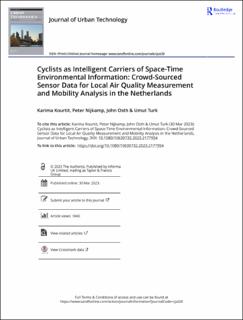Cyclists as Intelligent Carriers of Space-Time Environmental Information: Crowd-Sourced Sensor Data for Local Air Quality Measurement and Mobility Analysis in the Netherlands
Peer reviewed, Journal article
Published version
Permanent lenke
https://hdl.handle.net/11250/3122365Utgivelsesdato
2023Metadata
Vis full innførselSamlinger
Sammendrag
In recent years, slow travel modes (walking, cycling) have gainedmuch interest in the context of urban air quality management.This article presents thefindings from a novel air qualitymeasurement experiment in the Netherlands, by regardingcyclists as carriers and transmitters of real-world information onfine-grained air quality conditions. Using individual sensors onbicycles—connected to a GPS positioning system—online localpollution information originating from cyclists’detailed spatialmobility patterns is obtained. Such air quality surface maps andcyclists’mobility maps are then used to identify whether thereare significant differences between the actual route choice andthe cyclists’shortest route choice, so as to identify theimplications of poor air quality conditions for their mobilitychoices. Thus, the article seeks to present both a detailedpollution surface map and the complex space-time mobilitypatterns of cyclists in a region, on the basis of online quantitativedata—at any point in time and space—from bicycle users in agiven locality. In addition, the article estimates their response—interms of route choice—to detailed air-quality informationthrough the use of a novel geoscience-inspired analysis of space-time“big data.”The empirical test of our quantitative modelingapproach was carried out for the Greater Utrecht area in theNetherlands. Ourfindings confirm that spatial concentration of airpollutants have great consequences for bike users’route choicepatterns, especially in the case of non-commuting trips. We alsofind that cyclists make longer trips on weekends and in theevenings, especially towards parks and natural amenities.

